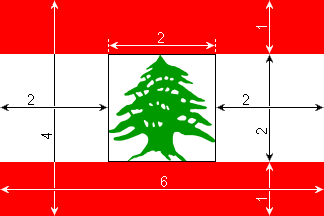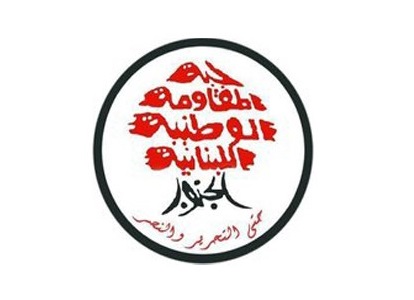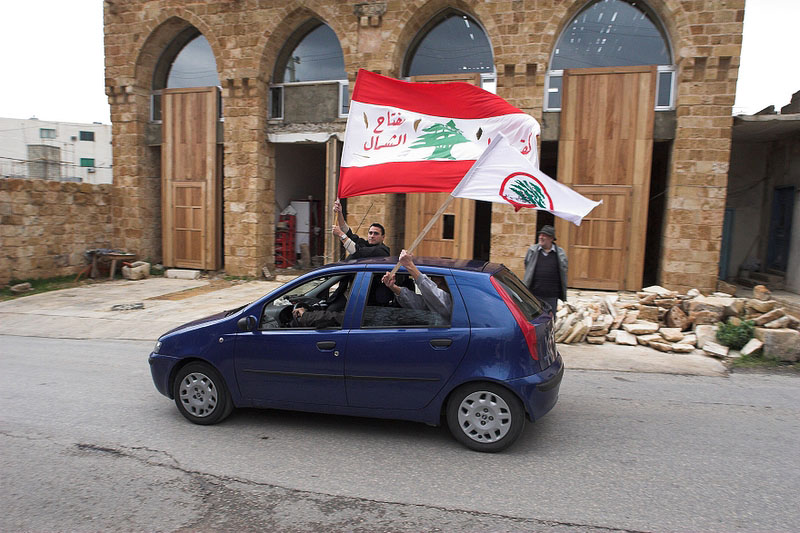|
Lebanese Nationalism
Lebanese nationalism is a nationalist ideology which considers the Lebanese people as a separate nation independent from the Arab world and strives to maintain Lebanon as an independent nation-state. The ideology may consider the Lebanese people to be direct descendants of the Phoenicians, a concept associated with Phoenicianism. The ideology is highly controversial and has been criticized for disuniting the Lebanese people rather than uniting them. While Lebanese nationalism appeals to the Lebanese Maronite community, it is generally unpopular among Lebanese Muslims, who often support Pan-Arabism and Pan-Islamism, as well as among Greek Orthodox Christians. History The Druze and Maronite community in Lebanon played an important role in the formation of the modern state of Lebanon in the early 18th century, through a governing and social system known as the " Maronite-Druze dualism" in Mount Lebanon Mutasarrifate This ideology is rooted in the 19th-century sectarian war betwe ... [...More Info...] [...Related Items...] OR: [Wikipedia] [Google] [Baidu] |
Flag Of Lebanon
The national flag of Lebanon () is a horizontal triband of two red stripes enveloping a central white stripe which is twice the height of each red stripe. Centered on the white stripe is a green cedar of Lebanon tree (''Cedrus libani''), touching both red stripes. Adopted on 7 December 1943, shortly before Lebanon gained independence from France, the flag's design reflects the country's geography, history, and cultural heritage. The red stripes are commonly interpreted as symbolizing the blood shed by the Lebanese people during their struggles for independence, while the white stripe represents peace, purity, and the snow-capped mountains of Lebanon. The cedar tree, a national symbol for centuries, stands for immortality, resilience, and hope, embodying Lebanon's identity as the "Land of the Cedars". The flag's origins trace back to the early 20th century, with the cedar tree becoming a prominent symbol during the French mandate period. The current design was finalized during a ... [...More Info...] [...Related Items...] OR: [Wikipedia] [Google] [Baidu] |
Druze In Lebanon
The Lebanese Druze () are an ethnoreligious group constituting about 5.2 percentLebanon 2015 International Religious Freedom Report U.S. Department of State. Retrieved on 2019-04-23. of the population of . They follow the faith, which is an [...More Info...] [...Related Items...] OR: [Wikipedia] [Google] [Baidu] |
Amal Movement
The Amal Movement () is a Lebanese political party and militia affiliated mainly with the Shia community of Lebanon. It was founded by Musa al-Sadr and Hussein el-Husseini in 1974 as the "Movement of the Deprived." The party has been led by Nabih Berri since 1980. The Amal movement gained attention from Shia outcry after the disappearance of Musa al-Sadr and saw a renewal in popularity after Israel's invasion of Lebanon in 1978. The Iranian Revolution of 1978–79 also provided momentum for the party. The Amal Movement is the largest predominantly Shia party in parliament, having fourteen representatives to Hezbollah's thirteen. Amal has an alliance with Hezbollah. Name The movement's current name was originally used by the Deprived Movement's militia, the " Lebanese Resistance Regiments" (). This name, when abbreviated, created the acronym "Amal", which is Arabic for "hope".Augustus R. Norton, ''Amal and the Shi'a: Struggle for the Soul of Lebanon'' (Austin and London ... [...More Info...] [...Related Items...] OR: [Wikipedia] [Google] [Baidu] |
Said Akl
Said Akl (; 4 July 1911 – 28 November 2014) was a Lebanese poet, linguist, philosopher, writer, playwright and language reformer. He is considered one of the most important Lebanese poets of the modern era. He is most famous for his advocacy on behalf of codifying the spoken Lebanese Arabic language as competency distinct from Standard Arabic, to be written in a modern modified Roman script consisting of 36 symbols that he deemed an evolution of the Phoenician alphabet. Despite this, he contributed to several literary movements (primarily, symbolism (arts), symbolism) in Modern Standard Arabic, producing some of the masterpieces of modern Arabic Belles-lettres, belle lettres. Akl aligned himself with Lebanese nationalism, and was one of the founding members of the Lebanese Renewal Party in 1972. The party, characterized by its Phoenicianism, pro-Phoenicianism stance, aimed to distance Lebanon from Pan-Arabism. His views found support within the Guardians of the Cedars movement. ... [...More Info...] [...Related Items...] OR: [Wikipedia] [Google] [Baidu] |
Lebanese Renewal Party
The Lebanese Renewal Party – LRP (Arabic: حزب التجدد اللبناني transliteration ''Hezb al-Tajaddud al-Lubnani'') or Parti de la Renovation Libanaise (PRL) in French, was a political party in Lebanon formed in 1972 by a number of staunch Lebanese nationalists including activist Etienne Saqr, poet Said Akl and writer May Murr. Its ideology was based on Phoenicianism and the idea that the Lebanese nation is an independent non-Arab entity and is not part of the Arab World. This orientation also warned against pan-Arabism, leftist ideology and the Palestinian military presence in Lebanon. History It was formed by right-wing activists opposed to the presence of the Palestinian refugees in Lebanon. The refugee population also included a substantial element of Palestine Liberation Organization (PLO) fighters, especially after the 1970 Black September events in Jordan. This created severe tension in Lebanon, and is believed by many to have been a driving factor behind t ... [...More Info...] [...Related Items...] OR: [Wikipedia] [Google] [Baidu] |
National Bloc (Lebanon)
The National Bloc is a secular political party in Lebanon that was founded in 1943 as a parliamentary bloc for the 1943 Lebanese elections by Émile Eddé but was later formed as a political party in 1946. History The Lebanese National Bloc party is a social liberal, democratic and secular party based on the principles of the Human Rights Charter. The party endeavors to strengthen Lebanon's entity, preserve its sovereignty and independence along with its distinctive role in the neighboring countries and the whole world. It also seeks to lay the foundations and promote the rule of law, social justice, public and private freedoms, and the well-being of the country's citizens. The party was founded by Émile Eddé in 1946. Following his death, his son, Raymond Eddé, was elected as his successor in 1949. The party represented the main political force in Lebanon in the 1940s and 1950s along with the "Constitutional Bloc" led by President Bechara El Khoury. The bloc had great ac ... [...More Info...] [...Related Items...] OR: [Wikipedia] [Google] [Baidu] |
Guardians Of The Cedars
The Guardians of the Cedars (GoC; ; ''Ḥurrās al-Arz) was'' a Lebanese nationalist party and former militia in Lebanon. It was formed by Étienne Saqr (also known with the kunya "Abu Arz" or "Father of the Cedars") and others along with the Lebanese Renewal Party in the early 1970s. It operated in the Lebanese Civil War under the slogan: ''Lebanon, at your service.'' The militia was explicitly anti-Palestinian, and gained a reputation for brutality against Palestinian fighters. Creation The Guardians of the Cedars started to form a militia in the years leading up to the Lebanese Civil War and commenced military operations in April 1975. In September 1975, Communiqué No. 1 was issued to denounce advocates of the partition of Lebanon. The second communiqué contained a bitter attack on the Palestinians. The third articulated the party's stance on the issue of Lebanese identity: Lebanon should dissociate itself from Arabism. The party spread its messages by means of graffi ... [...More Info...] [...Related Items...] OR: [Wikipedia] [Google] [Baidu] |
National Liberal Party (Lebanon)
The National Liberal Party (NLP, , ''Ḥizb Al-Waṭaniyyīn Al-Aḥrār'') is a nationalist political party in Lebanon, established by President Camille Chamoun in 1958. It is now under the leadership of Camille Dory Chamoun, his grandson, who is the MP for the Maronite seat in Baabda, elected in the 2022 Lebanese parliamentary elections allied with the Lebanese Forces Party. Policies The party has adopted a hard line in regard to the preservation of Lebanese independence, and to the safeguard of the distinctive liberal practices in Lebanon with respect to freedom of expression and opinion and religious freedoms. Most Lebanese political parties have a sectarian basis; although the NLP during the civil war was mainly supported by Christians, the NLP is a non-sectarian, national, liberal, political party that adopted the Chamoun'ism (الفكر الشمعوني) that transcends sectarianism and has support among Lebanese citizens of different religions or sects. History F ... [...More Info...] [...Related Items...] OR: [Wikipedia] [Google] [Baidu] |
Lebanese Forces
The Lebanese Forces ( ') is a Lebanon, Lebanese Christianity in Lebanon, Christian-based political party and Lebanese Forces (militia), former militia during the Lebanese Civil War. It currently holds 19 of the 128 seats in Lebanon's Parliament of Lebanon, parliament, being the largest party of the country. The organization was created in 1976 by Pierre Gemayel, Pierre and Bachir Gemayel, Camille Chamoun, and other party leaders during the Lebanese Civil War. It was initially an umbrella organization coordinating all the right-wing party militias of the Lebanese Front and served as the main resistance force of the front. The Kataeb Regulatory Forces provided the largest share of fighters, and the Kataeb, Kataeb Party had the largest share on the council. Despite its original creation from party militias, the Lebanese Forces accepted new recruits without any specific party allegiance. During the civil war, the Lebanese Forces fought different opponents at different times: the P ... [...More Info...] [...Related Items...] OR: [Wikipedia] [Google] [Baidu] |
Kataeb Party
The Kataeb Party (), officially the Kataeb Party – Lebanese Social Democratic Party ( '), also known as the Phalangist Party, is a right-wing Christian political party in Lebanon founded by Pierre Gemayel in 1936. The party and its paramilitary wings played a major role in the Lebanese Civil War (1975–1990), opposing Palestinian insurgency in South Lebanon as well as collaborating with Israel. The Phalangists were responsible for the Black Saturday massacre, the Tel al-Zaatar massacre, Ehden massacre, and the Karantina massacre. In 1982, Pierre's youngest son Bachir, the leader of the party's militia, was elected President, but was assassinated before he could take office. This led to Phalangist militiamen committing the infamous Sabra and Shatila massacre during the 1982 war, with support from the IDF. Bachir was succeeded by his older brother Amine, who led the party through much of the war. In decline in the late 1980s and 1990s during the Syrian occupat ... [...More Info...] [...Related Items...] OR: [Wikipedia] [Google] [Baidu] |
Lebanese Civil War
The Lebanese Civil War ( ) was a multifaceted armed conflict that took place from 1975 to 1990. It resulted in an estimated 150,000 fatalities and led to the exodus of almost one million people from Lebanon. The religious diversity of the Lebanese people played a notable role in the lead-up to and during the conflict: Lebanese Christians and Lebanese Sunni Muslims comprised the majority in the coastal cities; Lebanese Shia Muslims were primarily based throughout southern Lebanon and in the Beqaa Valley in the east; and Lebanese Druze, Druze and Christians populated the country's mountainous areas. At the time, the Lebanese government was under the influence of elites within the Maronite Christian community. The link between politics and religion was reinforced under the Greater Lebanon, French Mandate from 1920 to 1943, and the country's parliamentary structure favoured a leading position for Lebanese Christians, who constituted the majority of the population. However, Leban ... [...More Info...] [...Related Items...] OR: [Wikipedia] [Google] [Baidu] |
Arab Nationalism
Arab nationalism () is a political ideology asserting that Arabs constitute a single nation. As a traditional nationalist ideology, it promotes Arab culture and civilization, celebrates Arab history, the Arabic language and Arabic literature. It often also calls for unification of Arab society.Requiem for Arab Nationalism by Adeed Dawisha, ''Middle East Quarterly'', Winter 2003 It bases itself on the premise that the people of the —from the to the |




